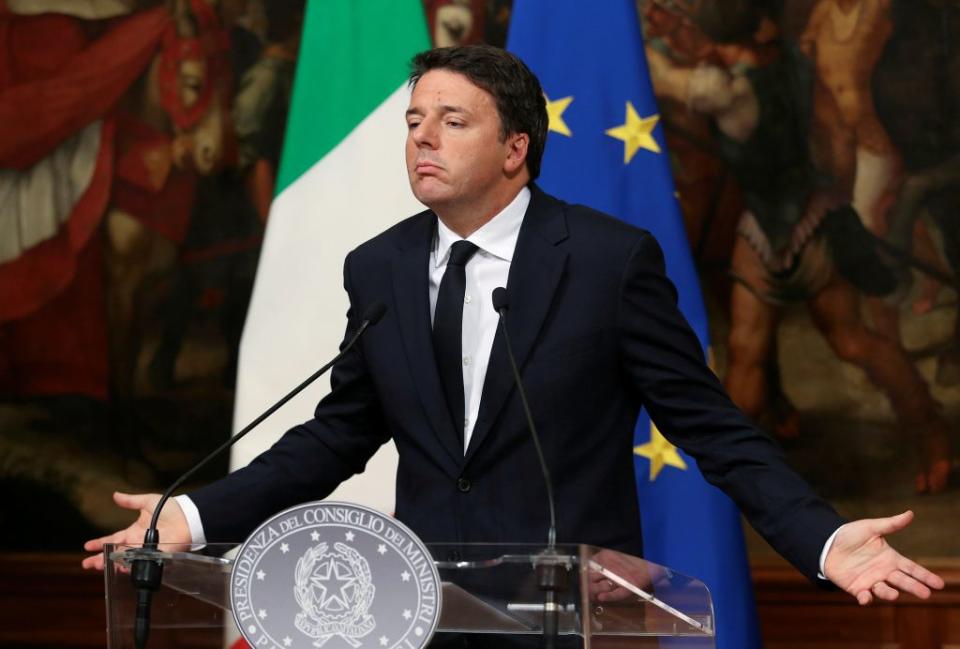Italian prime minister Matteo Renzi is quitting. What happens next?

Italy is about to get its sixth prime minister in 10 years, as Matteo Renzi will tender his resignation on Monday (Dec. 5) following a big defeat in a referendum on constitutional changes the day before.
“My government experience ends here,” he said in an emotional speech after the polls closed at 11pm local time.
The votes are still being counted at the time of writing, but the result is clear—voters comprehensively rejected the constitutional reforms proposed by Renzi, with the “No” camp winning some 60% of the vote. Turnout was high, at nearly 70%.
On paper, the referendum was about a package of changes to the constitution designed to streamline decision-making by centralizing power with the lower house of parliament. But the vote became a referendum on Renzi himself, after he—rashly, in hindsight—promised to resign if it went against him.
Like Britain’s David Cameron earlier this year, the Italian leader was undone by a Yes-No vote that wasn’t directly about him or his party. Instead, broad dissatisfaction with a sickly economy, high unemployment, and toxic banks appears to have won the day in Italy.
Markets are jittery, with the euro falling against the dollar as soon as the result of the vote became clear. It’s not a rout, though, in part because markets were expecting a “No” vote based on polls in the run-up to referendum day.

Small wiggles in Italy’s financial market, however, can have big consequences—the country has more than €2 trillion ($2.1 trillion) in outstanding government debt, worth more than 130% of GDP.
What happens now?
Renzi says he will tender his resignation to president Sergio Mattarella on Monday. After that, things get messy.
How messy? Wolfango Piccoli of research firm Teneo Intelligence reckons these are the possible scenarios (click here for a PDF):

The likeliest path is that Italy gets a caretaker government, with finance minister Pier Carlo Padoan considered a front-runner to serve the rest of the term. The next general election is due in 2018, but Renzi’s opponents, which include the center-right, populist far-right, hard left, and other anti-establishment parties, may try to force a snap election in the hopes of gaining power. The sooner the election, the more uncertainty and instability it will entail for Europe’s fourth-largest economy.
Italy is no stranger to political turmoil, of course—it has had 63 governments since the founding of the republic after World War II. Even so, a renewed bout of instability is unwelcome. The Five Star Movement, an upstart populist party that wants to hold a referendum on Italy’s membership of the euro zone (but not the EU itself), is neck and neck with Renzi’s Democrats as the party likely to garner the most votes in the next election.
Complicating matters is a push to reform the country’s electoral laws, intended to award the most popular party bonus seats to ensure more stable government majorities. The rejection of constitutional reforms puts these electoral changes in doubt—perversely, that probably hurts the chances of the populists celebrating Renzi’s defeat gaining power, according to analysts at Manulife.
This makes it far too simplistic to say that what happened in Italy is akin to the Brexit vote in the UK or Donald Trump’s victory in the US. In Rome, the populists agitated for voters to stick with the status quo, and the result could make it harder for them to seize power down the line. The target of their ire was 41-year-old Renzi, Italy’s youngest-ever prime minister, who they painted as part of an ossified, ineffectual establishment. There are many steps that would need to happen before anything like Brexit—or “Quitaly,” if you will—is a remote possibility in Italy.
What’s clear, however, is that a founding member of the EU and euro zone has been shaken, and the reverberations are unlikely to break it out of its economic stupor.

Sign up for the Quartz Daily Brief, our free daily newsletter with the world’s most important and interesting news.
More stories from Quartz:

 Yahoo Finance
Yahoo Finance 